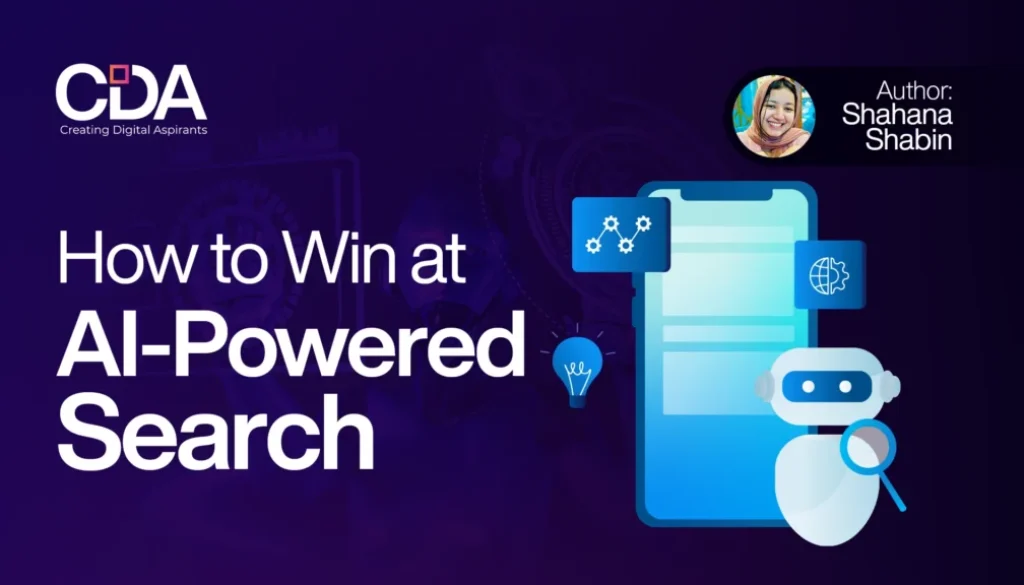How to Win at AI-Powered Search
AI search is here, and it’s shaking up the SEO world.
While some fear content theft, others see a golden opportunity. These AI-powered tools, fuelled by advanced NLP (natural language processing), offer more accurate and relevant search results.
Like the saying goes, The early bird catches the worm. Marketers who adapt their strategies to this new change faster will benefit the most.
Table of Contents

Basic Idea Behind AI and LLM in Terms of Search Algorithms
We are entering an era where traditional rule-based search engines that rely on keyword matching will transition to AI- or LLM-powered systems.
Traditional search engines relied on keyword matching and link-based metrics, but when it comes to AI, it understands the context a thousand times better. Using a range of vast data sets, LLMs are able to use precise language and give highly accurate responses.
For marketers, this means adapting to content strategies that are not just keyword-based but also about being helpful, user-centric pieces of content that match with search intent.
Key Differences Between Traditional and AI-Powered Search
- Searchability: When it comes to AI search, it can understand the meaning of keywords and queries. They go a step further than mere keyword matching and consider the entire context of a search. For example, LLM would also know that “the best way to learn German” would require techniques and resources and return the relevant results that are varied in perspective.
- Natural Language Queries: Users are now searching using more everyday language. One of such changes has to come from marketers who have to optimize content for complete questions and statements. It is no longer enough to simply put keywords into content and hope they will be relevant to readers.
- Semantic Search: AI has the ability to understand the meaning of phrases and their sentiments. Therefore, not only words that are exactly the same are used to seek relevant information; synonyms and related terms can be used and still produce good results.
- Content Quality: Search engines powered by AI are concerned with content that is of a high standard with informative aspects. What are the key aspects taken into consideration by the LLM? The quality, relevancy, and how interesting the material is. Which means well-written and useful content will earn a better rating than poorly-written articles stuffed with high SEO keywords

Create a marketing strategy optimized for AI search: 9 steps
- Focus on User Intent: The focus here is to understand the user queries and the intent behind them. Produce content catering to these needs.
- Target More Natural Language-Based Queries: Try to create contents that speak in a conventional way of language style, which will be more related to how users type queries in their search bar.
- Use Structured Data and Schema Markup: Adding schema markups to your website can help a lot when it comes to this kind of search results, so that AI can easily interpret the importance and context of your content with user intent.
- Incorporate Keywords Naturally: While keyword relevance is still important, it should blend seamlessly into your narrative.
- Update your content regularly: Refreshing your content on a regular basis will ensure that it is considered fresh and relevant by AI engines.
- Improve Readability: Format the content properly with headings, bullet points, and small sentences for a more user-friendly experience and for better search engine rankings.
- Use Multimedia: Add images and videos to add color to your content to bring more user interaction.
- Create backlinks from authority sites: Getting high authority backlinks will benefit your post, for instance, in AI-powered search engines.
- Interacting with Your Audience: Get your audience to comment on your posts and social media interactions, which are indicators of valuable content that search engines key in on.
Why You Should Consider AI Search Into Your Marketing Strategy
Adding an AI search engine to your marketing strategy will enhance the market presence of your brand. Content that is complete, topical and high-resolution optimized to the needs of large language models (LLMs) — are content includes you in search results at the top. When AI-based search tools become closer to understanding user intent, the accuracy of search results is higher, and thus there are lower bounce rates as users are more engaged at your site.
Furthermore, LLMs study browsing behavior and search patterns of customers giving a richer profile of what exactly your target audience wants. This knowledge permits entrepreneurs to higher set their approaches in the context of influencer engagement. Seizing the power of AI search engines is about more than fitting in with the times — it’s also about protection for marketing strategies in an increasingly competitive environment.
Conclusion
The AI era of search engines is not just a future anymore; it’s here, so it’s better to adapt to it as early as possible. Whether you want to block the AI crawlers or to incorporate the SEO strategies that can align with the AI search, the decisions you make now will shape your brand’s visibility in the future of search.



